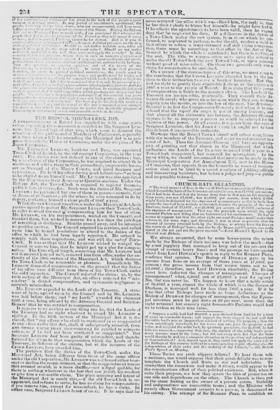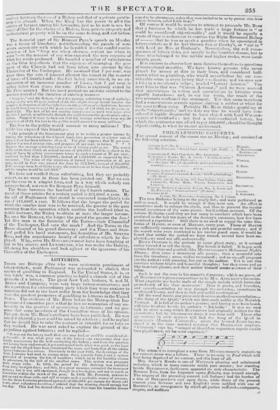" Suppose a noble lord had 20,000/. a year derived
from land let for a term of years on renewable leases; and suppose the State stepped in, and said that the noble lord's was an improvident method i,f sotling tin ptoperty ; that the State accordingly interfered, let the It.ases run out, gave the property a new value, and assigned the noble Ii,, d, by quarterly payments, the 20,0001. he bud hitherto received,—supposing, that case, the amount if the nobly lord's pecu- niary revenue must be the same; but did not every man feel that the State would thereby be maid rig a complete alteration in the position and independence of that individual ? And, depend upon it, they could not apply the same rule to the Bishops of tbis country without in a corresponding degree affecting also the independence of their order and the stability of the Chin ch."— Sir Robert Pars Speech on Monday.
These Tories are such slippery fellows! To bear them talk semetimes, one would suppose that their great delight was to con- template the Church and State as one mid indivisible. To strengthen the:connexion and make it closer, would appear to be the conscientious effort of their political existence. But, when It suits their purpose, see how they spurn the idea of protection on one side and dependence on the other. The Church is theuptt on the same footing as the owner of' a private estate. Stability and independence are convertible terms ; and the Minister who merely offers Government security to a parson, is denounced as his enemy. The attempt of Sir ROBERT PEEL to establith an .thatterv between thc case of a Bishop and that of a private gentle- 'man N.:as absurd. When the King has the power to allot the estetesof laymen among his favourites. just as he now is etes his eene.(; d'ilire for the choice a a Bishop, then private property and ecclesiastical property ill be on the same footing, and not before.



























 Previous page
Previous page